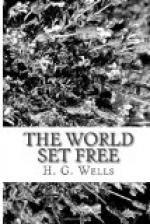And while this settlement of the country was in progress, the urban camps of the first phase of the council’s activities were rapidly developing, partly through the inherent forces of the situation and partly through the council’s direction, into a modern type of town....
Section 7
It is characteristic of the manner in which large enterprises forced themselves upon the Brissago council, that it was not until the end of the first year of their administration and then only with extreme reluctance that they would take up the manifest need for a lingua franca for the world. They seem to have given little attention to the various theoretical universal languages which were proposed to them. They wished to give as little trouble to hasty and simple people as possible, and the world-wide alstribution of English gave them a bias for it from the beginning. The extreme simplicity of its grammar was also in its favour.
It was not without some sacrifices that the English-speaking peoples were permitted the satisfaction of hearing their speech used universally. The language was shorn of a number of grammatical peculiarities, the distinctive forms for the subjunctive mood for example and most of its irregular plurals were abolished; its spelling was systematised and adapted to the vowel sounds in use upon the continent of Europe, and a process of incorporating foreign nouns and verbs commenced that speedily reached enormous proportions. Within ten years from the establishment of the World Republic the New English Dictionary had swelled to include a vocabulary of 250,000 words, and a man of 1900 would have found considerable difficulty in reading an ordinary newspaper. On the other hand, the men of the new time could still appreciate the older English literature.... Certain minor acts of uniformity accompanied this larger one. The idea of a common understanding and a general simplification of intercourse once it was accepted led very naturally to the universal establishment of the metric system of weights and measures, and to the disappearance of the various makeshift calendars that had hitherto confused chronology. The year was divided into thirteen months of four weeks each, and New Year’s Day and Leap Year’s Day were made holidays, and did not count at all in the ordinary week. So the weeks and the months were brought into correspondence. And moreover, as the king put it to Firmin, it was decided to ‘nail down Easter.’ . . . In these matters, as in so many matters, the new civilisation came as a simplification of ancient complications; the history of the calendar throughout the world is a history of inadequate adjustments, of attempts to fix seed-time and midwinter that go back into the very beginning of human society; and this final rectification had a symbolic value quite beyond its practical convenience. But the council would have no rash nor harsh innovations, no strange names for the months, and no alteration in the numbering of the years.




